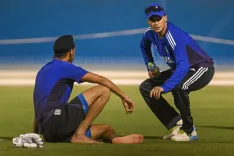Is An 18-Year-Old in Thiruvananthapuram Diagnosed with Acanthamoeba Infection?

Synopsis
Key Takeaways
- Acanthamoeba infection can lead to severe health complications.
- Early diagnosis and treatment are crucial.
- Health officials emphasize the importance of monitoring water sources.
- Swimming without nose clips increases risk.
- A temporary closure of contaminated pools is necessary for safety.
Thiruvananthapuram, Sep 14 (NationPress) An 18-year-old individual receiving care at the Government Medical College Hospital has been diagnosed with an acanthamoeba infection, a type of free-living amoeba (FLA) associated with the rare yet potentially lethal condition known as amoebic meningoencephalitis.
On Sunday, health officials confirmed that the young patient is currently receiving treatment with miltefosine and is in stable condition.
The patient initially sought medical attention at a private hospital in Kanjiramkulam on August 18, presenting symptoms such as fever, headache, and dizziness.
As his health deteriorated, he was transferred first to Neyyatinkara and subsequently to a private healthcare facility in the city.
Initial tests of the cerebrospinal fluid (CSF) did not reveal any trophozoites, but subsequent samples analyzed via PCR in Coimbatore confirmed the presence of acanthamoeba.
An early investigation indicated that the youth, together with six friends, had gone swimming on August 16 in the pool at Akkulam Tourism Village, which is operated by the District Tourism Promotion Council (DTPC).
The case report indicated that he swam and dove without a nose clip, which may have facilitated the infection. None of the six companions have exhibited any symptoms thus far.
Health authorities are also exploring other possible sources of water exposure. Currently, there are nine active cases of amoebic meningoencephalitis in the district.
This year, two fatalities have been recorded in Thiruvananthapuram, both involving individuals with pre-existing health conditions.
Last year, the district documented 20 cases, with clustering confirmed in seven instances.
In light of this incident, the DTPC has temporarily closed the pool for maintenance and comprehensive cleaning. Water samples have been collected and sent to the public health laboratory for PCR testing, with results anticipated within two days. Officials have emphasized that the pool will only reopen after receiving clearance.
Historical diagnostic records suggest that various free-living amoebae have caused infections in Kerala.
Between 2019 and 2023, Naegleria fowleri was identified in four cases across Malappuram, Thrissur, and Alappuzha. In 2024, a combination of Naegleria fowleri, Vermamoeba vermicularis, and Acanthamoeba infections was confirmed in patients from Malappuram, Thiruvananthapuram, Kannur, Kollam, Kozhikode, Palakkad, and Thrissur. Some cases in Thiruvananthapuram were also linked to exposure to piped water.
Health officials have called for enhanced monitoring of both recreational and household water sources, given the persistence of these pathogens in the environment.







